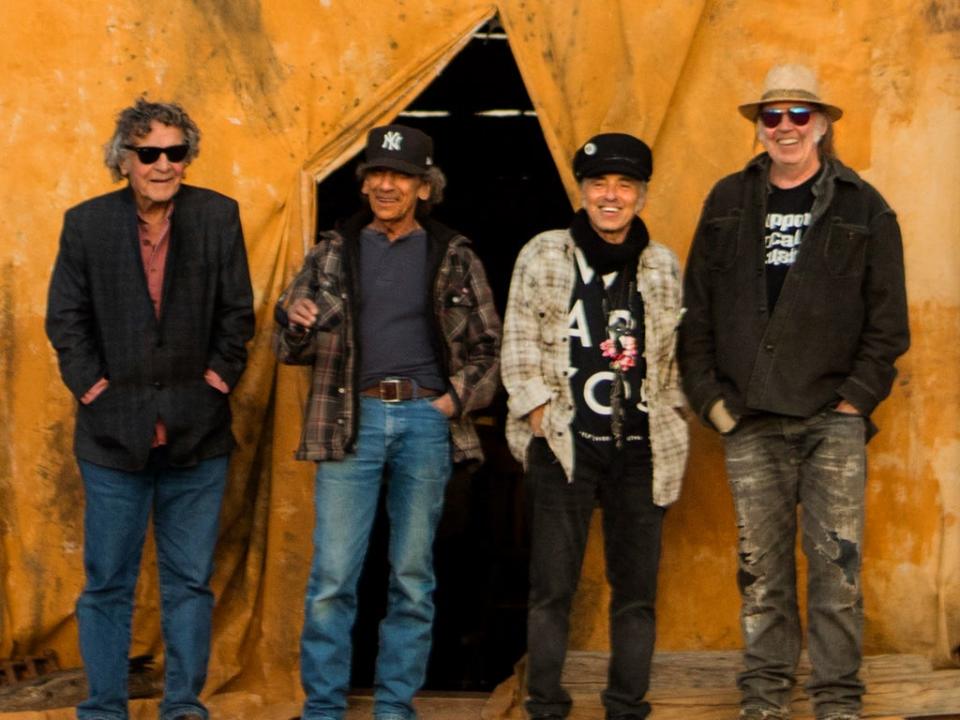Neil Young and Crazy Horse review, Barn: A rock-out among the hay bales

It’s been almost 50 years since Neil Young released his classic rural rock album, Harvest. Legend has it that when he invited former bandmate Graham Nash out to his San Francisco ranch to hear it, his guest was surprised to be asked to step into a rowing boat. It turned out Young had rigged his entire house as the left speaker and his entire barn as the right speaker, so Nash could enjoy the album in the middle of his private lake. When producer Elliot Mazer came down to the shore to check the sound was OK, Young apparently bawled back: “More barn!”
Half a century later, he’s delivered just that. There’s nothing new about what Young and his trusty band get up to on Barn. Written quickly and recorded on the hoof last summer (in “a restored off-grid 19th-century barn high up in the Rockies”), this is Young’s 41st album and finds him happy to plough old furrows, rotating reliably through well-worn chord patterns. Lyrically, the 76-year-old artist’s inner hippy is, as ever, at odds with his inner cynic. But fans will find deep comfort in the sound of Old Farmer Grunge cranking back into action, as his squeaky hinge of a voice swings back and forth over the well-maintained vintage machinery of Crazy Horse.
The album opens with “Song of the Seasons”, a sleepy acoustic number that sounds like an outtake from 1992’s Harvest Moon sessions. Its romantic sways of accordion, mellow strumming and melancholic vocals don’t quite prepare you for the band to turn the ignition on track two. But their engine purrs nicely on “Heading West” as Young tells the story of leaving home after his parents’ divorce, reminiscing about how “mummy got me my first guitar”. “Change Ain’t Never Gonna” is a low-slung jalopy of a harmonica-riffer, on which the biofuel-championing Young sneers at the ignorance of fellow Boomers refusing to give up their fossil fuels. Crazy Horse’s gears mesh in satisfyingly metallic fashion on the dirge-anthem of “Canerican” on which the Canadian Young – who recently became a US citizen – reflects on the changes he’s seen from the stage. He sings of being “all colours”... although I suspect he’s spent the last four decades staring out at crowds of nodding white folks in plaid shirts and ripped jeans.
The album sags in the middle, with honky-tonk track “Shape of You” finding Young caterwauling like a drunk uncle at an Ed Sheeran karaoke night. “They Might Be Lost” never goes anywhere. “Human Race” is a trudge of two chords and dull rhymes (“no one shares/ no one cares”) with a dud squall of a guitar solo. But things warm back up with the lullsome piano of “Tumblin’ Through the Years”, and the deeper crunch of the guitars on the moody slow-burn of “Welcome Back”. Young admits it might be a song we’ve heard before but hopes it could “open windows” in the listener’s soul. He encourages us to “mingle with the stars in the sky”... “before your computer turns on you.” Then he winds up the album with the soppy-croaky chant of “Don’t Forget Love”. This isn’t so much a barnstormer of an album as a reassuringly earthy rock-out among the hay bales.
Read More
LP review, Churches: Celestial pop with a rock’n’roll edge
Khalid review, Scenic Drive: R&B singer delivers a second album that’s all vibe, no edge

 money
money 